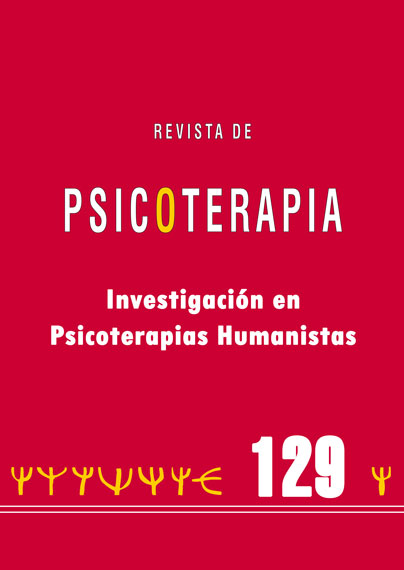Self-injurious Behavior, Suicidal Ideation and Acceptance and Commitment Therapy: A Case Study
DOI:
https://doi.org/10.5944/rdp.v35i129.41281Keywords:
Suicide, self-harm attempt, third-generation therapies, Acceptance and Commitment TherapyAbstract
Background: The increase in suicidal ideation and behavior represents an important social problem that demands the development of effective therapeutic interventions. Method: A therapeutic intervention based on Acceptance and Commitment Therapy (ACT) is presented to address the suicidal ideation of J., who had previously attempted suicide. The intervention focused on the components of the hexaflex model of ACT, seeking to promote psychological flexibility over 15 sessions. Results: Although there was no significant reduction in distress, J. demonstrated positive changes in viewing private events without reacting literally, indicating progress toward acceptance and adaptation to her internal experiences. Conclusions: Through this intervention, J. showed more actions aligned with his life values, suggesting progress towards a life focused on values and less influenced by emotional discomfort. These results highlight the effectiveness of ACT-based intervention in cases of suicidal ideation.
Downloads
References
Barnesa, S.M., Borgesa,L.M., Smitha, G.P., Walser, R.D., Forstera, J.E., Bahraini, N.H. (2021). Randomized Controlled Acceptability and Feasibility Trial of ACT for Life. Journal of Contextual Behavioral Science, 20, 35-45
Beck, A. T., Steer, R. A., & Brown, G. (1996). Beck Depression Inventory–II (BDI-II).
Bond, F. W., Hayes, S. C., Baer, R. A., Carpenter, K. M., Guenole, N., Orcutt, H. K., Waltz, T., & Zettle, R. D. (2011). Preliminary psychometric properties of the Acceptance and Action Questionnaire-II: a revised measure of psychological inflexibility and experiential avoidance. Behavior Therapy, 42, 676-688.
Ducasse, D., Jaussent, I., Arpon-Brand, V., Vienot, M., Laglaoui, C., Béziat, S., Calati, R., Carrière, I., Guillaume, S., Courtet, P., & Olié, E. (2018). Acceptance and Commitment Therapy for the Management of Suicidal Patients: A Randomized Controlled Trial. Psychotherapy and Psychosomatics, 87(4), 211-222. https://doi.org/10.1159/000488715Hayes, S. C., Strosahl, K. D., & Wilson, K.
Hayes, S. C., Strosahl, K. D., & Wilson, K. G. (2015). Acceptance and Commitment Therapy: The Process and Practice of Mindful Change. Guilford Press.
Hayes, S. C., Strosahl, K. y Wilson, K. (1999). Acceptance and commitment therapy: an experiential approach to behavior change. Guilford.
Hayes, S. C., Wilson, K. G., Gifford, E. V., Follette, V. M., & Strosahl, K. (1996). Experiential avoidance and behavioral disorders: A functional dimensional approach to diagnosis and treatment. Journal of Consulting and Clinical Psychology, 64(6), 1152–1168.
Instituto Nacional de Estadística. (2023). Defunciones por suicidio. Resultados Nacionales. Recuperado de https://ine.es/jaxi/Datos.htm?tpx=61481
Nock, M. K., Borges, G., Bromet, E. J., Cha, C. B., Kessler, R. C., & Lee, S. (2008). Suicide and suicidal behavior. Epidemiologic Reviews, 30(1), 133-154.
Ruiz, F. J. (2010). A review of Acceptance and Commitment Therapy (ACT) empirical evidence: Correlational, experimental psychopathology, component and outcome studies. International Journal of Psychology and Psychological Therapy, 10(1), 125-162.
Ruiz, F. J., Langer Herrera, A. I., Luciano, C., Cangas, A. J. y Beltrán, I. (2013). Measuring experiential avoidance and psychological inflexibility: the Spanish version of the Acceptance and Action Questionnaire-II. Psicothema, 25, 123-129.
Sanz, J., Navarro, M., & Vázquez, C. (2003). Adaptación española del Inventario para la Depresión de Beck-II (BDI-II): 1. Propiedades psicométricas en estudiantes universitarios. Análisis y Modificación de Conducta. 29, 239-288.
Spielberger, C. D., Gorsuch, R. L., Lushene, R., Vagg, P. R., & Jacobs, G. A. (1983). Manual for the State-Trait Anxiety Inventory. Consulting Psychologists Press.
Spielberger, C.D. (1988). Professional Manual for the State-Trait Anger Expression Inventory (STAXI) (research ed.). Psychological Assessment Resources.
Walser, R. D., Garvert, D. W., Karlin, B. E., Trockel, M., Ryu, D. M., Taylor, C. B., & Dobson, K. S. (2015). Effectiveness of Acceptance and Commitment Therapy in treating depression and suicidal ideation in Veterans. Behaviour Research and Therapy, 74, 25-31.
Wilson, K. G., & Luciano, C. (2002). Terapia de Aceptación y Compromiso. Alianza Editorial.
Wilson, K. G., & Luciano, C. (2002). Terapia de aceptación y compromiso: un tratamiento conductual orientado a los valores. Pirámide.
Downloads
Published
How to Cite
Issue
Section
License
Copyright (c) 2024 Revista de Psicoterapia

This work is licensed under a Creative Commons Attribution-NonCommercial 4.0 International License.
Authors who publish in this journal accept the following conditions:
-
Authors retain copyright and grant the journal the right of first publication, with the work registered under the Creative Commons CC-BY-NC 4.0 International license. This license allows third parties to cite the text and use it without alteration and for non-commercial purposes, provided they credit the authorship of the work and its first publication in this journal.
-
Authors may enter into other independent and additional contractual agreements for the non-exclusive distribution of the version of the article published in this journal (e.g., including it in an institutional repository or publishing it in a book), provided they clearly indicate that the work was first published in this journal.
-
The views expressed in the articles are solely the responsibility of the authors and in no case do they reflect the opinions or scientific policies of the journal.














